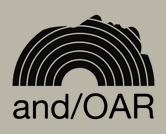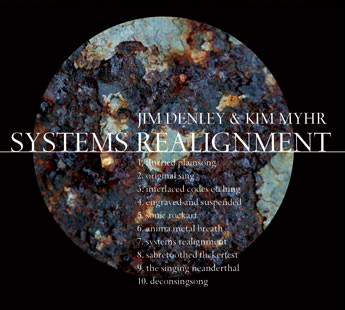
catalog number: either/1
artist: JIM DENLEY & KIM MYHR
title: Systems Realignment
format: CD
status: sold out
Track List:
01. Flurried Plainsong
02. Original Sing
03. Interlaced Codes Etching
04. Engraved And Suspended
05. Sonic Rockart
06. Anima Metal Breath
07. Systems Realignment
08. Sabretoothed Flickerfest
09. The Singing Neanderthal
10. Deconsingsong
Jim Denley: alto saxophone, flutes and electronics
Kim Myhr: acoustic guitar and simple mechanics
Jim Denley and Kim Myhr met in Sydney in early 2007, and
"Systems Realignment" was recorded six months later. Since then
the duo has done numerous concerts in Europe and Australia.
"Systems Realignment" is not only a completely new take on
guitar/saxophone combinations, but an attempt to rethink their
fundamental musical methodology. There is an interest in
materiality, almost at a primitive level, without being embarrassed
to work with resulting harmonic structures. Frequency and rhythm
is examined, but not within conventional grids. Perhaps the
positivity of the result, comes from the project not rejecting other
musics, but embracing elements from a vast range of sources
ranging form traditional to contemporary and electronic music.
The result is a lush and surprising flurry of acoustic, electronic and
mechanical gestures.
Jim Denley is Australia’s foremost improviser with a career
spanning over three decades. An emphasis on spontaneity, site-
specific work and collaboration has been central to his work. He
sees no clear distinctions between his roles as instrumentalist,
improviser and composer. He was recently awarded a Fellowship
by the Australia Council for 2006 & 2007 and is currently working
towards a paradigm shift in the notion and perception of the
saxophone; to establish it’s relevance to ancient and current
traditions in Australian music, and to extend it's range with the
addition of innovative electronics and miking.
Kim Myhr is a young and innovative guitarist with a vivid and
fresh approach to his instrument. With an emphasis on a wide
range of percussive, harmonic and timbral effects on the acoustic
guitar, he has embarked on an international career with
performances throughout Europe, USA, Canada, Australia and
Japan. His other projects these days is a duo with Sebastien Roux
(electronics/FR), the trio MURAL with Denley and Ingar Zach and
the group “Silencers” with Benoit Delbecq (piano/FR). He has also
performed with Martin Tetreault, Anthony Pateras, Toshi
Nakamura, Tetuzi Akiyama, Robbie Avenaim to mention a few.
--------------------------------------------------------
SYDNEY MORNING HERALD (October 2009)
Silence and sound define each other, although small enough
musical sounds can blur the line between the two, creating that
intensity of intermittent silence you might find in a rainforest. This
is the area inhabited by Jim Denley (alto sax, flutes and
electronics) and Kim Myhr (acoustic guitar, simple mechanics),
whose free improvisations have the spontaneity, surprise and
capacity to delight of birdsong. There is a gentle underscore of
rustles and pops, out of which more strident sounds may
suddenly burst, such as Denley's luxuriantly breathy flute on Sonic
Rockart, which is like some exotic bird, far above in the canopy.
Immerse yourself in it on a still night, or use it ambiently.
(John Shand)
TOUCHING EXTREMES (August 2009)
If a single record, among the latest batches received, could
symbolize this writer’s current partiality for a legitimate
exploration in a studio setting, as opposed to the release of an
all-inclusive unsatisfying live performance, this should be it. Jim
Denley (alto sax, flute, electronics) and Kim Myhr (acoustic guitar
and “simple mechanics”) are captured in ten tracks in which the
overindulgence and the posturing often associable to present-day
improvisation are replaced by a simple concept - regularly and
conveniently forgotten nowadays to grant undeserved glory to
nonentities defining themselves as “artists” in the name of a
corrupted democracy of expression - called musicality. A lovely
feeling materializing as soon as you press “play”, quite relieving
to experience after having spent months squeezing our instinctive
refusal of intellectually tinged rubbish to obtain two or three
logical drops, indispensable for a decent write-up, matching the
two or three isolated noises around which that drivel is usually
built.
There is in fact evidence, since the very beginning of this program,
of an unambiguous alchemy at work. One immediately breathes
consistency while listening to the popping-and-fizzing emissions
of the reeds in parallel with the fundamental constituents of the
guitar, whose wood we can almost smell the essence of, thanks
to the detailed quality of the recording. On a first glance, the
homogeneity demonstrated by the couple throughout might be
exchanged for a lack of inventiveness, but this is totally untrue.
There’s much to be found in terms of colour and resonance in this
non-stylish, non-regional exploitation of the entire attributes of
instruments apparently so dissimilar, an agglutinate generating
effects that are manifestly beneficial, pushing the ears towards a
type of perception which ideally should be linked to a direct
experience in a remote land (Denley is an expert of this field of
action). This is probably due to the musicians’ preference for the
percussive features of their playing, which rather frequently
reveal a quasi-African aroma (incredible how Myhr manages to
make that machine sound like a mbira time and again). Yet
sticking a pseudo-world music tag to this duet would be a gross
misinterpretation of something more profound, both in the crucial
meanings and in regard to the analytical capacity of the
instrumentalists, always in the condition of eliciting captivating
aural tints in dialogues that never appear as previously
rehearsed.
A mind-opening paradigm of mutual recognition and acute
attention to the communication between interacting entities,
Systems Realignment is another example of Dale Lloyd’s
discernment in choosing materials to publish on his labels,
regardless of genres and expectations. (Massimo Ricci)
THE WATCHFUL EAR (July 2009)
Tonight I have been listening to Systems Realignment, a recent
CD release on the either/OAR offshoot of the and/OAR label by
Australian Jim Denley and Norwegian (but now living in Australia I
believe) Kim Myhr. On the ten tracks here Denley plays alto sax,
flutes and electronics, while Myhr uses acoustic guitar and simple
mechanics. I was pointed towards this disc by Al Jones, head
honcho of Bagatellen, who conducted a short inter-review of the
album with the two musicians here.
The first thing that hits you when you initially put the disc into the
player is the quality and clarity of the recording. A mix of gentle
percussive clicking and light scraping appears, split perfectly
between the two speakers. While I always appreciate it, its rare
that I think good recording makes any difference to the actual
music, but here every last detail rings out, every tones dies away
with a soft echo, it really does sound like the musicians are sat
behind me playing. The music itself sound somewhere between
the vitality of say John butcher with John Russell and the deep
concentration on individual sounds of someone like Jeph Jerman.
Sorry f that sounds vague, but at any one time this CD feels alive,
on the move, but yet also seems to include only carefully picked
sounds neatly placed on top of each other.
In fact it is a very nice listen indeed. Most of the sounds used to
form it are small, clicks, pops, taps and chimes, quite often
sounding quite unlike sax or guitar. On the whole, they tumble
together quick and fast, but actually manage to avoid any sense
of frantic pace. There are slow parts here and there, and they are
often quite beautiful, such as the bell-like guitar notes that ring
out gently at the start of 'Original Sing', the oddly named second
track. The album is entirely improvised, and was played live in the
studio, but despite this it somehow manages to avoid many of
the trappings of improvised acoustic music (although there are
electronics involved it all still sounds very acoustic). In places, the
two musicians seem to play separate to each other, avoiding the
obvious call-and-response to and fro’ you might expect, and
working through a series of quite different pieces. The eighth
track, named 'Sabretoothed Flickerfest' with good reason begins
as a skittery drone, tiny repetitive sounds fluttering away under a
fizzy sound that could be electronic or could be the contact mic
Denley attaches to the mouthpiece of his sax obscuring natural
vibrations. It feels a very purposeful, well structured piece, quite
different to other tracks on the album, suggesting some kind of
advance planning, but in the Bagatellen interview linked to above
Denley and Myhr assure us that no such thing took place and the
music is entirely spontaneous.
Systems Realignment is something of a hidden treasure, unlikely
to be talked about by many, but with the potential to be liked by
a sizeable audience. I suspect it would appeal to both traditional
improv fans and also those to whom a degree of electronics is
essential. It is neither overly busy or full of silences, but retains
an attention to sound quality, both in the choices made by the
musicians in the moment, and then later how they are presented
on the disc. Thanks to Al for pointing this one out to me or
otherwise I would probably also have passed it by.
(Richard Pinnel)
WIRE (June 2009)
At 52, saxophonist and flautist Jim Denley is Australia's most
important improvising musician, similar in spirit to Ross Bolleter in
that his creative language both recognises the symbolic import of
colonial detritus - Denley and collaborator Peter Ready used to
make 'New Music Constructions' out of industrial junk - and also
the essential irrelevance of both European art music and
American jazz to the Australasian experience. Since returning
home from Europe in the late 1970s, Denley has applied himself
to a naturalistic idiom on saxophone and flute that makes Eric
Dolphy's moves in that same direction seem tentative.
There are echoes in these duets with guitarist Kim Myhr of
Denley's early 80s work in Relative Band, which was essentially a
duo with Jon Rose. The basic palette is spiky, and each individual
track is deceptively formless, but it's impossible to miss the long,
slow pulses that run through each piece, giving them all a
satisfying logic; or indeed the didgeridoo and hollow-log effects
that lend the music an immediately identifiable provenance.
Bolleter has talked about the characteristic effect of Denley's
music as a process of instantaneous transformation in which
individual sounds don't signify anything other than the processes
of change. Denley's use of electronics and Myhr's 'simple
mechanics' extend and enhance that impression on "Flurried
Plainsong", "Sonic Rockart" and the title track in particular.
Two tracks, "Original Sing" and "Deconsingsong", were recorded
at a separate session and are subtly different, but together with
"The Singing Neanderthal" they convey a sense that Denley is
after a kind of sonic vernacular that plugs into what can only
crudely be called a collective unconscious. He is convinced that
our rational and intuitive selves are now in a thoroughly
dysfunctional relationship. Music like this helps to realign them.
(Brian Morton)
AFTENPOSTEN (April 2009)
Norwegian Kim Myhr has allied himself with Australian Jim Denley.
The duo keeps a tight dialogue, and is intimate and quiet, but
delivers up contrast. Myhr plays a guitar style with ancient
undercurrents, and Denley strengthens this impression with
saxophone, flute and electronics, especially on the title track.
"Systems Realignment" helps to save improvised music from
stagnation, and takes freedom seriously. As such, is a good
listening experience. (Arild R. Andersen)
DAGBLADET (April 2009)
The guitarist Kim Myhr (27) received Sparebank 1's JazZtipend
(monetary award) during Molde Jazzfestival last year, which will
see him return to the festival with Trondheim Jazzorkester for a
commissioned piece this year. Featured on this piece is also the
Australian freejazz veteran/saxophonist Jim Denley who will also
appear at Kongsberg Jazzfestival in duo with Myhr. The two
musicians will also embark on a Norwegian tour as well as doing a
trio concert with Sidsel Endresen at Nasjonal Jazzscene this
autumn.
Denley/Myhr's "Systems Realignment" is unashamed
experimentation with alternative sound solutions for acoustic
guitar and alto saxophone/flutes, and there´s a refreshing, if not
alien music making. Ordinary rhythms and melodies are absent,
but the result is still warmer and more inviting than what is usual
for contemporary music at this degree of pling plong.
(Terje Mosnes)
JUST OUTSIDE (March 2009)
Denley (alto sax, flutes, electronics) and Myhr (acoustic guitar,
"simple mechanics") here fashion capable free improv with a nod
toward Australian native traditions, the latter not done overtly
but more by passing references to the hums associated with the
didgeridoo and dry, clattering sounds that evoke the skittering of
birds and other desert fauna. Both possess an attractive clarity of
sound, allowing a strong sense of spaciousness into the music at
the same time avoiding many free improv routines. Myrh, who I've
not previously heard, is an engaging guitarist, even more so (I
get the impression) when he plays "straighter" as on a solo piece
here, "Engraved and Suspended". Overall, a fairly enjoyable
pathway trod between an EAI-y approach and a more expansive
one. (Brian Olewnick)
















